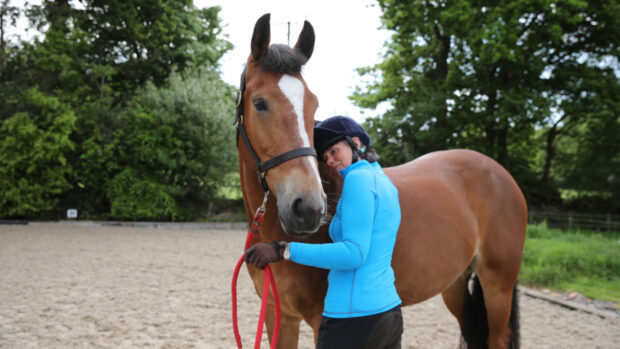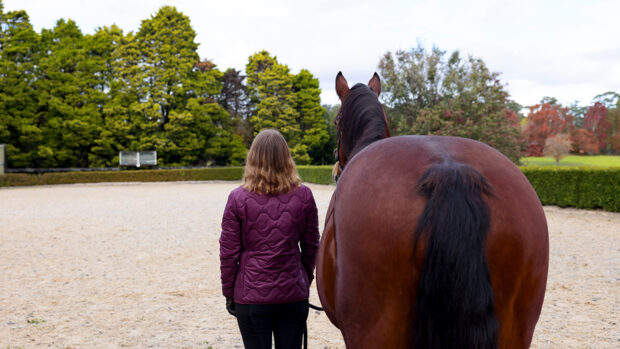Adam Cromarty discusses supporting mental health with the knowledge that neurodivergent people can thrive in a sporting environment
The theme for this year’s Mental Health Awareness Week, running from 13 May, is “Moving more for our mental health’. In our sport we move a lot, so maybe it’s a good opportunity to stop, take a breath and see how we and those around us are doing.
Showjumping has a sense of community, but it can also be lonely. Travelling, whether locally or internationally takes you away from family and a sense of stability. It’s an emotionally challenging sport and while the top end may look glamorous, even the best riders in the world are under immense pressure to continually produce good results.
Losing an owner or sponsor could take you from the top to the bottom. The odds are stacked against you and the statistics show that you lose more than you win. Add in the financial stress with the cost of competing and showjumping is definitely an at-risk sport for anxiety. The training, mental build-up and warm-up is substantial. We’ve all felt that 200-word-a-minute inner dialogue at the in-gate.
Other sports offer a chance to settle in once in the competition arena, whether it be during a eight-minute dressage test or a 90-minute football match. Showjumping offers us about a 75-second release. Then there’s the internal debrief after you cross the finish line.
Over the years, the taboo around mental health has dissipated. Many of the world’s top riders now look to professionals to help learn techniques and mechanisms. From skills used to stay positive during less successful periods to performance-enhancing tools.
I’ve always had an interest in the human brain and how it works. My time at school was pretty terrible. It wasn’t until I was at university that I found out I had dyslexia. Then, during lockdown, I was recording something with comedian, impressionist and horse show dad Rory Bremner. We ended up discussing attention deficit hyperactivity disorder (ADHD) and I could relate to many of his symptoms. He suggested I get tested. A couple of weeks later, I had a diagnosis, a large amount of clarity and something in common with Justin Timberlake.
Seeing ADHA as a superpower
Given the work I do, I see my ADHD as something of a superpower. It allows me to think outside the box, and offers me sharpness, humour and creativity. There are some downsides though. I am constantly looking for my keys, wallet and phone. Some social situations can be draining and focusing on anything mundane can be a challenge.
Studies have shown that neurodivergent people tend to drift towards careers that suit their brains and sport is definitely on that list. A testament to this is world number 12, Daniel Coyle. When you watch him you can see an unlimited amount of natural feel, skill and a real hunger to win. You wouldn’t know that he is dyslexic.
If a related distance walks as a very short six strides and the plan is to ride it on five, most people would remember the number and maybe even count the five. For Daniel, he remembers to land and move forward and the five arrives for him. He can be reactive and not worry about the numbers.
Shane Breen is also in the club and writes endless lists as a coping mechanism.
For those who think their children may be neurodivergent, please get them tested. There are so many role models in our sport and a diagnosis can help you support them to achieve their ambitions. The same applies for adults too. Sadly, the wait for an ADHD assessment on the NHS can be over a year but there are private options readily available.
I would like our national federation to do more to support mental health at all levels. Online content and workshops would be well received. At a show, course plans could be published online at the start of the day, with more time to learn them.
Whether it be the state of the world, keyboard warriors or social media commentary, things can seem dark. Let’s remember the importance of empathy and kindness.
● Do you have experience of dealing with mental health challenges in the sport? Let us know about it at hhletters@futurenet.com, including your name, nearest town and country, for the chance for your letter to appear in a forthcoming issue of the magazine
- This exclusive column will also be available to read in Horse & Hound magazine, on sale Thursday 9 May
You might also be interested in:

Why riders can be susceptible to mental health problems — and how to take action

Carl Hester on what can cause poor mental health in dressage riders – and how to tell if you’re affected

‘Not just a bang on the head’: mental health campaign encourages riders to ‘re-think concussion’

Subscribe to Horse & Hound magazine today – and enjoy unlimited website access all year round
Horse & Hound magazine, out every Thursday, is packed with all the latest news and reports, as well as interviews, specials, nostalgia, vet and training advice. Find how you can enjoy the magazine delivered to your door every week, plus options to upgrade your subscription to access our online service that brings you breaking news and reports as well as other benefits.




